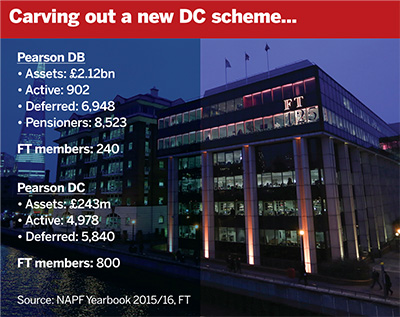Employers eyeing a transition into a contract-based defined contribution arrangement must consider the impact of a shift away from trust-based governance on members and administration, experts have said.
Debate over a perceived governance shortfall in contract-based arrangements has been prevalent in the industry since a 2013 review of defined contribution schemes by the Office of Fair Trading deemed provider governance insufficiently independent.
In response, April’s pension reforms mandated contract-based DC schemes to establish a five-strong independent governance committee.
However, debate continues on the divergence between the two regulatory structures in the DC arena – which are overseen by the Financial Conduct Authority and the Pensions Regulator.
A new era
In July, Pearson, owner of the Financial Times group to which Pensions Expert belongs, confirmed the sale of the group to Japanese publishing company Nikkei.
The FT will cease to participate in the Pearson plan from the expected completion date of the sale at the end of November, and all defined benefit and DC members will be transferred into a new arrangement.
A spokesperson from the FT said: “In the case that we do not conclude employee consultations prior to the sale closure, we will ensure no one is disadvantaged by that delay.”
They’re supposed to have some kind of interaction with the members but we haven’t seen how this is going to develop so far and to be frank I haven’t seen any IGC who has tried to reach out to its members in a meaningful way
Henry Tapper, First Actuarial
The new DC section will offer a contribution structure “identical to those currently provided in the Pearson plan”.
However, the employer has been exploring potential new structures with an insurance provider, prompting questions from staff and unions about the ongoing monitoring and governance of the scheme under the new arrangement.
The news group held a beauty parade of DC providers last week in which insurer Zurich came out on top.
Steven Bird, National Union of Journalists’ father of chapel at the FT, said the union and company pensions committee, composed of elected management, union and member representatives, have prioritised governance throughout discussions.
“It’s an absolute priority,” said Bird. “It’s important who decides who gets ill-health benefits, who are dependants in death-of-service – it’s not just the investment records, it’s the admin and service.”
However, the FT was not required to launch a formal consultation for DC members. Bird said: “It’s wrong that the company didn’t consult the DC constituency over this. They were not legally bound to but they should have. Governance is a sign they care about the staff rather than just getting an off-the-shelf product.”
March away from trusts
Marcus Fink, partner at law firm Ashurst, said the wider move away from employer trust-based arrangements towards schemes run by insurance providers has been a “well-trodden” path over recent years.
He added: “The benefit of having a trust-based arrangement is the trustees will know the members, they will know what the population of members consists of [and] can tailor their investments accordingly.”
Fink said employers can “plug the gap” with effective communications and sustain a bespoke level of governance for staff members by establishing an in-house governance committee.
However, Lesley Browning, partner at law firm Norton Rose Fulbright, said it would be difficult for any scheme to transfer members’ past-service rights from a trust-based scheme to an arrangement under contract.
“It’s much easier to transfer to a mastertrust than it is to transfer everyone to a [group] personal pension scheme,” she said. “If you’re going from a trust to a trust, you can bulk transfer without consent provided that you get an actuarial certificate.”
Employer committees give control
Gurmukh Hayre, head of DC at consultancy KPMG, said key to any transition from trust-based to contract-based arrangements was the extent employers continue to oversee and monitor the scheme once in place.
When a new FT pension plan is agreed we will be setting up an FT governance committee which includes employee representatives and an independent adviser
Financial Times
“Larger and more hands-on employers who have moved to contract-based normally look to put in place a governance committee to oversee the monitoring of the plan, communications, service standards and member experience,” he said.
Henry Tapper, director at consultancy First Actuarial, said large companies can have control and “real say” about the arrangement they have in place but smaller companies with less clout could struggle.
“They’re supposed to have some kind of interaction with the members but we haven’t seen how this is going to develop so far and to be frank I haven’t seen any IGC who has tried to reach out to its members in a meaningful way, except for Legal & General.”
Message received
A spokesperson from the Financial Times said the request from staff for improved trustee and governance arrangements has been heard.
“When a new FT pension plan is agreed we will be setting up an FT governance committee which includes employee representatives and an independent adviser,” the spokesperson said.
“The committee would perform a governance function similar to the trustees of the Pearson plan, and we are confident that this will offer a strong governance framework.”

















